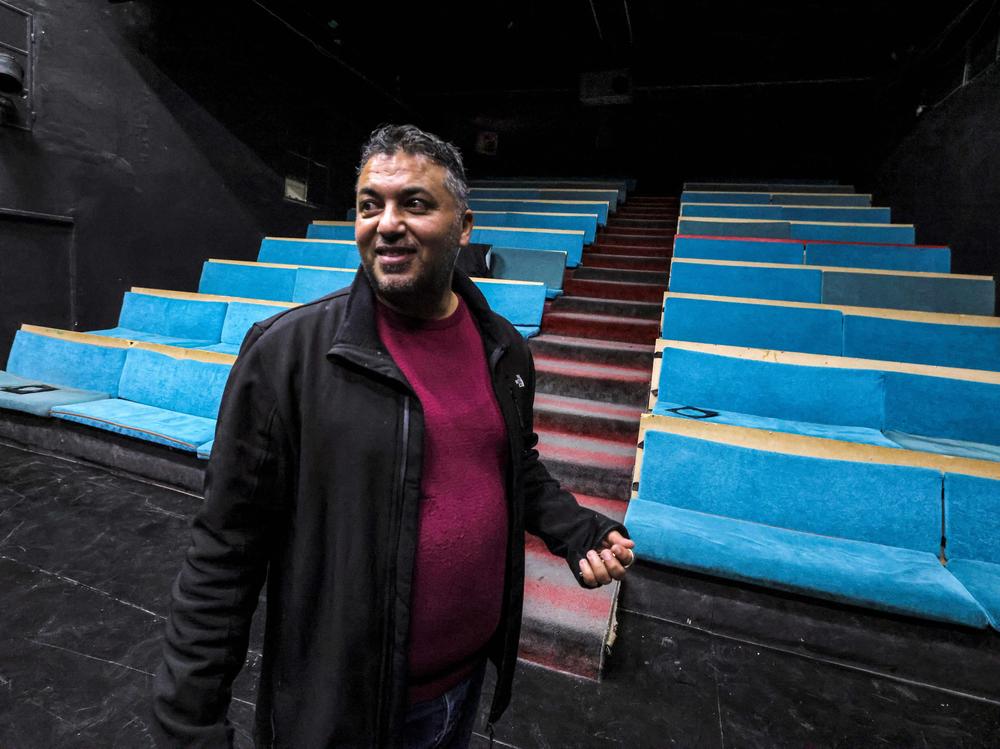Section Branding
Header Content
Artists rally in support of West Bank theater members detained since Dec. 13
Primary Content
The Freedom Theatre has endured extraordinary stress and privations since it was first founded in 1987 by an Israeli and Palestinian couple. Located in a refugee camp on the West Bank, it has gained international renown for original plays and creative workshops for Palestinian children and families.
But in 2011, its artistic director was shot by masked assailants. Juliano Mer-Khamis, an Israeli film director, was the adult son of the theaters' founders. Last year, the chair of its board, Bilal al-Saadi, was arrested by the Israeli army. He was detained for six months in what PEN America described as "a serious human rights violation."
Last summer, the theater was shelled by the Israeli military as part of a days-long campaign in the area, with extensive damages reported by the non-partisan Middle East Institute and documented by the theater. On Wednesday December 13, in the midst of one of the biggest raids on Jenin in decades, the Israeli army ransacked and vandalized the theater, according to its staff, and arrested artistic director Ahmed Tobasi and two of its members. Israel says it was conducting an operation searching for militants, who have been expanding their activities in Jenin for over a year.
Tobasi was detained for 24 hours. NPR was unable to locate him for an interview, but in an December 15 appearance on the left-wing program Democracy Now, Tobasi said Israeli soldiers broke all the computers in the theater, blindfolded him and threw him in the mud by a jeep. He said he was afraid they were going to run him over.
"Everything is destroyed," Tobasi said in the video interview, which included images of the theater's raided offices. "This is a theater. It's not a military base. It's not a terrorist house. There are no guns. There are books, pictures, cameras, music, instruments. All of it been destroyed."
In a statement, the staff of the Freedom Theatre said the Israeli army fired weapons in the inside of the theater, scrawled slogans in Hebrew on its walls and later arrested Mustafa Sheta, the theater's general manager, and Jamal Abu Joas, a recent graduate of the Freedom Theatre Performing Arts School. Abu Jonas, the statement says, was also severely beaten.
Both men are now in an Israeli prison, according to a website that supports Palestinian artists.
An Israeli military spokesperson said in a statement, "The IDF conducted a counterterrorism activity in the Jenin camp, during which the forces located many weapons, ammunition and explosive devices in the territory of the camp. During the activity, hundreds of suspects were detained, and after initial questioning, those not involved with terrorism were released, while the rest were handed over for further questioning. At this time, we are not aware of IDF fire within the Jenin theatre. The activity is under ongoing review by commanders."
More than 1,000 British playwrights, actors and directors have signed an open letter in solidarity with the Freedom Theatre and calling for the release of the detained theater artists. Signatories include leading feminist playwright Caryl Churchill and five-time Olivier winning director Dominic Cooke. Artists in France, Italy, Mexico, South Africa, Germany and Belgium have also rallied in support.
On Tuesday night, a New York City protest in support of the Freedom Theatre artists included Osh Ashruf, founder of Broadway for All and Patricia McGregor, the artistic director of the New York Theatre Workshop, who evoked Pulitzer Prize-winning playwright August Wilson when she addressed the rally.
"He asked one question. What are your hands, heads and hearts doing with your time on Earth to make it a better place?" McGregor asked. "Our brothers and sisters at the Freedom Theater in Jenin have been answering that question through art for decades...and we will continue to watch and demand until they are released. "
Copyright 2023 NPR. To see more, visit https://www.npr.org.

